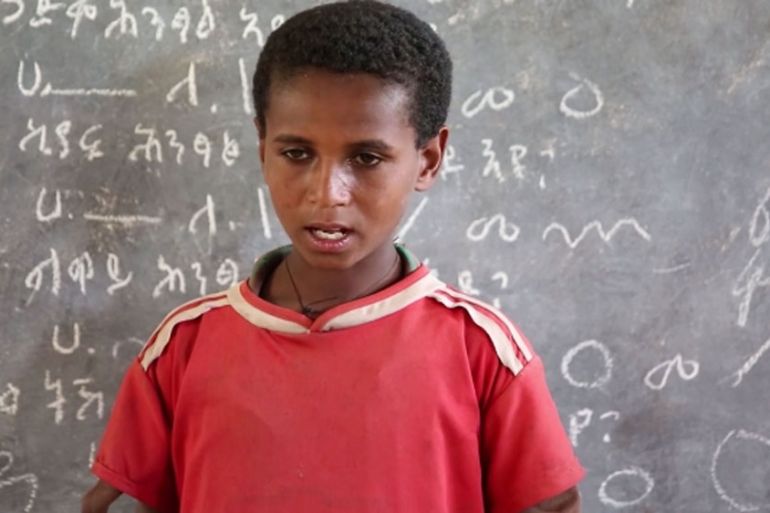UNICEF: Early deaths await 69 million children by 2030
Angola tops the list worldwide with 157 of 1,000 children under age five dying annually from “preventable causes”.

Every day, 13-year old Birhanu Haftu walks four hours to fetch water in the Tigray region of northern Ethiopia. Severe drought has hit this year and children such as him struggle to get an education being so stuck in poverty.
“We catch the water in cups, then we carry it back using jerry cans,” Haftu said. “I don’t study at night because I’m too exhausted.”
Keep reading
list of 4 itemsIsraeli attack kills 10, mostly children, in Gaza’s Rafah
Cass Review: Feminists accused of being ‘unkind’ have been vindicated
Ten years after Chibok girls kidnapping: One woman’s struggle to move on
Haftu is among 247 million children from sub-Saharan Africa facing extreme poverty who are deprived of basic education and other needs to survive and break the cycle of hardship, the UN said.
The lost generation: Children in conflict zones
In a report released on Tuesday, the United Nations Children’s Emergency Fund (UNICEF) also said by 2030, as many as 69 million children could die from “preventable causes” before the age of five if political leaders fail to address global inequality.
The report – State of the World’s Children 2016 – said children are affected “disproportionately” by violent conflicts, humanitarian emergencies and natural disasters, as well as health crises.
Nearly half are from Africa. Angola tops the list worldwide with 157 of 1,000 children under five years old dying annually as of 2015. It is closely followed by Chad at 139 and Somalia at 137 child deaths for every 1,000 children.
Additionally, 167 million children face poverty and 750 million could become child brides globally unless action is stepped up.
“Denying hundreds of millions of children a fair chance in life does more than threaten their futures. By fuelling inter-generational cycles of disadvantage, it imperils the future of their societies,” Anthony Lake, UNICEF’s executive director, said in the report.
“We have a choice: Invest in these children now, or allow our world to become still more unequal and divided.”
![Across sub-Saharan Africa, children born to mothers with no education are almost three times more likely to die before they turn five [Raj Yagnic/UNICEF]](/wp-content/uploads/2016/06/8dea2f3bbbb64f588e0540f4ca1a3cc9_18.jpeg)
‘Investment on education’
Since the 1990s, under-five mortality rates have been cut in half while extreme poverty worldwide has been reduced by almost 50 percent.
But despite that “significant progress”, the report said, the improvements are neither even nor fair.
Across much of South Asia and sub-Saharan Africa, children born to mothers with no education are almost three times more likely to die before age five than those born to mothers with a secondary education.
|
|
And girls from the poorest households are 2.5 more likely to marry as children than girls from the wealthiest households.
Today, about 124 million children do not go to primary and lower-secondary school. Two in five children who do finish primary school have not learned how to read, write, or do simple maths.
The report said investment in education is critical to cut the poverty and mortality rates.
By 2030, the report estimates that $340bn a year will be needed to fund education to the secondary level in low-income areas.
Currently, there is a “global shortfall” of $8.5bn a year in education funding for the 75 million children in the worst-hit crisis areas, translating to an average $113 per child, according to the report.
On average, each additional year of education a child receives increases his or her adult earnings by about 10 percent. For each additional year of schooling completed, that country’s poverty rate falls by 9 percent on average.
“When we provide education, shelter and protection for children caught in conflicts, we help mend their hearts and their minds – so that, someday, they will have the ability and the desire to help rebuild their countries,” Lake said.
|
|